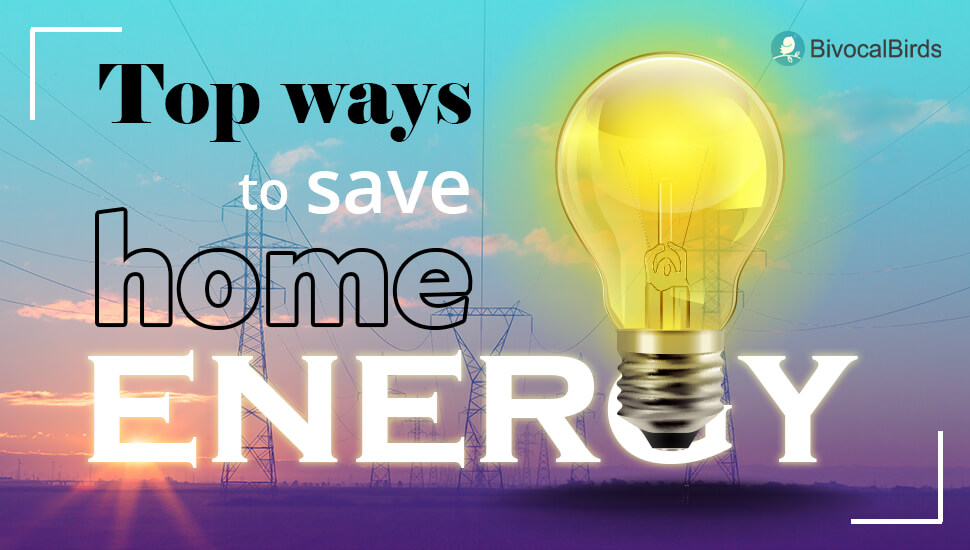Top Ways To Save Home Energy
 29-Mar-2022
29-Mar-2022Every month, each home spends a significant amount of money on electricity. Families with more than two people, particularly those with children and the elderly, typically spend far more energy than they should. Energy efficiency in the house is beneficial from both an environmental and financial standpoint. People frequently overlook how helpful it is to minimize domestic energy use.
It helps households to not only assist the environment but also prevent themselves from overspending year after year. A few modest tweaks might help you save money on your energy bill.
There are several home energy conservation techniques available, ranging from minor everyday lifestyles to large expenditures that not only benefit the environment but also lower your energy expenses. So, what are some easy ways to cut down on energy use at home? There are surely some ways you can use to save on your energy consumption which is mentioned below:
Adapt to New Lifestyle
Switching off lights and appliances when they are not in use is a simple way to save energy. You may also save energy by doing household duties by hand, such as hanging your clothes to dry rather than putting them in the dryer or hand-washing your dishes.
Cutting down the heat on your thermostat in the winter and using your air conditioner less in the summer are the behavior changes with the largest potential for utility savings. Heating and cooling expenditures account for about half of a typical household's utility bills, therefore lowering the intensity and frequency of heating and cooling will save the most money. You may use tools to find out where the majority of your power goes in your house and which devices consume the most energy on a daily basis.
Read More:- Beginner’s Guide: How to Get Secured Your Home
Change Light Bulbs
Traditional incandescent light bulbs use a lot of energy and need to be replaced more frequently than their energy-efficient counterparts. Conventional bulbs consume 25-80 per cent less power and last 3 to 25 times longer than halogen incandescent bulbs, compact fluorescent lights (CFLs), and light-emitting diode bulbs (LEDs).
While energy-efficient bulbs are initially costlier, their optimal energy consumption and longer lifespan result in lower long-term costs.
Opt for Energy Efficient Appliance
Appliances account for around 13% of total household fuel use on average. When buying an appliance, keep two numbers in mind: the initial purchase price and the yearly running cost. Though high-efficiency devices may cost more upfront, their operational expenses are typically 9 to 25% cheaper than traditional versions.
While looking for an energy-efficient appliance, search for one that has the ENERGY STAR designation, which is a federal assurance that the equipment will use less energy while in use and when not in use than regular models. The amount of energy saved varies depending on the device. ENERGY STAR certified clothes cleaners, for instance, use 25% less energy and 45 percent less water than standard washers, whereas ENERGY STAR refrigerators use just 9% less energy.
Look for Automatic Appliances
When you are sleeping or gone, a digital thermostat may be programmed to automatically turn off or reduce heating and cooling. You can decrease unnecessary energy usage from heating and cooling by installing a smart thermostat without having to upgrade your HVAC system.
Different varieties of smart thermostats are available, and they may be programmed to meet your weekly plan. Additional functionality of smart thermostats may include alerts for air filter replacement or HVAC system faults, which may help your heating and cooling system run more efficiently.
Reduce Water Expenses
Water heating consumes a large amount of your total energy use. In addition to purchasing an energy-efficient water heater, you may save money on water heating by simply using less hot water, turning down the thermostat on your water heater, or insulating your water heater and the first six feet of hot and cold water pipes.
If you're thinking about replacing your old water heater with a more energy-efficient one, keep two things in mind: the kind of water heater you want and the type of fuel it will use. Tankless water heaters, for example, are energy efficient, but they're not a good solution for large families since they can't handle numerous and continuous hot water usage. Efficient water heaters may save anywhere from 8% to 300 per cent on energy compared to traditional storage water heaters.
Prefer Using Microwave Instead of Stove
Reheating meals, like other domestic duties, is an essential yet energy-intensive operation. A burner, based on your preferences, may help to maintain the flavor of food. However, data suggests that a microwave is much more efficient, regardless of taste. A stove's design renders it susceptible to energy loss. While a microwave consumes a lot of electricity, it does it in quick bursts for short periods of time.
Also Read: The Next Step Towards Net-zero Energy Buildings
Be Sunlight Dependent
Illumination accounts for a substantial portion of energy bills, and reducing your energy use by harnessing sunlight is a natural approach to do so. It is preferable to have north and south-facing windows rather than east and west-facing windows if possible. In the winter, this allows for more reflecting light, which creates heat, while also limiting harsh light. While east and west-facing windows let in more direct sunshine, they don't let in as much heat.
Saving energy is important for a variety of reasons. Simple energy-saving techniques can help you save money, increase the value of your house, and preserve the environment all at the same time. Regardless of why you began conserving energy in the first place, they are excellent benefits. Simply taking a little step toward a more energy-conscious lifestyle will help you realize the benefits of being more energy efficient.



